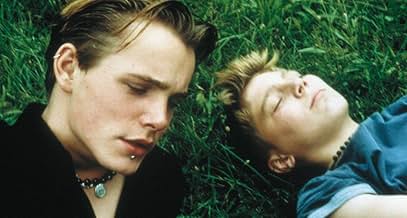A 15-year-old Long Island boy loses everything and everyone he knows, soon becoming involved in a relationship with a much older man.A 15-year-old Long Island boy loses everything and everyone he knows, soon becoming involved in a relationship with a much older man.A 15-year-old Long Island boy loses everything and everyone he knows, soon becoming involved in a relationship with a much older man.
- Awards
- 20 wins & 18 nominations total
Paul Dano
- Howie Blitzer
- (as Paul Franklin Dano)
Tony Michael Donnelly
- Brian
- (as Tony Donnelly)
Frank Rivers
- Man with Pizza
- (as Frank G. Rivers)
- Director
- Writers
- All cast & crew
- Production, box office & more at IMDbPro
Featured review
On the Long Island Expressway, Howie says, "You got your lanes going east, you got your lanes going west, and you got your lanes going straight to hell". Perched on a barrier above the Long Island Expressway ready to jump, 15 year old Howie Blitzer (Paul Franklin Dano) tells us that the L.I.E. has claimed many lives including folk singer Harry Chapin, film director Alan J. Pakula, and Howie's mother in a recent car crash. Now scared and alone, emotionally distant from his sleazy, corrupt father, and having fallen in with a gang of thieves and male prostitutes, Howie is poised to become the next victim of the Expressway.
L.I.E. is the coming of age story of a boy who must quickly develop resiliency to cope with the loss of the things closest to him; his mother to the L.I.E., his father to the criminal justice system, and his best friend Gary to the lure of California. More real than American Beauty, more honest than Ghost World, less sleazy than Kids or Happiness, L.I.E. is a tender and thoughtful, often funny, examination of the lives of suburban teens who are without guidance or adult role models and who must develop inner strength simply in order to survive.
Like taking drugs to numb the pain of their boredom and loneliness, Howie, his friend Gary, and a few others have been robbing the expensive houses of their Long Island neighbors just for the excitement of seeing how much they can get away with. One of their escapades takes them to the house of Big John Harrigan (brilliantly performed by Scottish actor Brian Cox), a macho ex-marine well known in the neighborhood as a chickenhawk (for those uninitiated, an individual with a predilection for sex with young men). This encounter is a turning point for young Howie.
Howie and Big John develop a relationship which, while the possibility of man-boy sex is clearly implied, is not threatening or exploitative, but provides Howie with the substitute father-figure he so desperately needs. In portraying Big John, first time director, Michael Cuesta resists moralizing and courageously defies stereotyping. (NOTE: in reality, the sexual predator is more likely to be an inconspicuous business or professional man who uses sex in a furtive manner to satisfy some unfilled need, not the flamboyant, in-your-face sleaze ball that Big John represents).
Paul Franklin Dano as Howie completely captures the confusion and neediness of a lonely teen trying to discover who he is, and he is very reminiscent of a young River Phoenix. Howie comes alive as an immature, lonely, and sexually confused teen, yet a sensitive and intelligent individual who writes poetry to give voice to his loneliness. Howie startles Big John with his knowledge of Chagall and quotes this Walt Whitman strain from Leaves of Grass to him while riding in his car:
"Never more the cries of unsatisfied love be absent from me, Never again leave me to be the peaceful child I was before what there, in the night, By the sea, under the yellow and sagging moon, The messenger there arous'd-the fire, the sweet hell within, The unknown want, the destiny of me."
It is uncertain until the end whether Howie will succumb to the forces closing in on him or develop the inner strength to cope with his loss.
This movie has caused some consternation in some quarters because it shows a sexual predator as a complex human being with feelings. Cuesta does not advocate man-boy relationships but does show that these relationships can often be based on mutual need, something some may overlook when screaming "sexual abuse". Cuesta forces us to look at the multi-leveled components of the relationship, both the predator and the protector, the manipulator and the manipulated. The filmmaker presents the older man as he is, an exploiter with layers of self-hatred and shame, but also as a human being, capable of warmth and love. At the end, if nothing else, I sensed that Howie through his pit stop relationship with Big John was older, wiser, and much more capable of dealing with his problems.
Despite some poorly drawn characters (his father in particular is a caricature) and an oversimplified ending that would have been better left on the cutting room floor, I truly loved this film and would recommend it highly.
Stupidly rated NC-17, L.I.E. is a film that should be seen by both teenagers and their parents.
L.I.E. is the coming of age story of a boy who must quickly develop resiliency to cope with the loss of the things closest to him; his mother to the L.I.E., his father to the criminal justice system, and his best friend Gary to the lure of California. More real than American Beauty, more honest than Ghost World, less sleazy than Kids or Happiness, L.I.E. is a tender and thoughtful, often funny, examination of the lives of suburban teens who are without guidance or adult role models and who must develop inner strength simply in order to survive.
Like taking drugs to numb the pain of their boredom and loneliness, Howie, his friend Gary, and a few others have been robbing the expensive houses of their Long Island neighbors just for the excitement of seeing how much they can get away with. One of their escapades takes them to the house of Big John Harrigan (brilliantly performed by Scottish actor Brian Cox), a macho ex-marine well known in the neighborhood as a chickenhawk (for those uninitiated, an individual with a predilection for sex with young men). This encounter is a turning point for young Howie.
Howie and Big John develop a relationship which, while the possibility of man-boy sex is clearly implied, is not threatening or exploitative, but provides Howie with the substitute father-figure he so desperately needs. In portraying Big John, first time director, Michael Cuesta resists moralizing and courageously defies stereotyping. (NOTE: in reality, the sexual predator is more likely to be an inconspicuous business or professional man who uses sex in a furtive manner to satisfy some unfilled need, not the flamboyant, in-your-face sleaze ball that Big John represents).
Paul Franklin Dano as Howie completely captures the confusion and neediness of a lonely teen trying to discover who he is, and he is very reminiscent of a young River Phoenix. Howie comes alive as an immature, lonely, and sexually confused teen, yet a sensitive and intelligent individual who writes poetry to give voice to his loneliness. Howie startles Big John with his knowledge of Chagall and quotes this Walt Whitman strain from Leaves of Grass to him while riding in his car:
"Never more the cries of unsatisfied love be absent from me, Never again leave me to be the peaceful child I was before what there, in the night, By the sea, under the yellow and sagging moon, The messenger there arous'd-the fire, the sweet hell within, The unknown want, the destiny of me."
It is uncertain until the end whether Howie will succumb to the forces closing in on him or develop the inner strength to cope with his loss.
This movie has caused some consternation in some quarters because it shows a sexual predator as a complex human being with feelings. Cuesta does not advocate man-boy relationships but does show that these relationships can often be based on mutual need, something some may overlook when screaming "sexual abuse". Cuesta forces us to look at the multi-leveled components of the relationship, both the predator and the protector, the manipulator and the manipulated. The filmmaker presents the older man as he is, an exploiter with layers of self-hatred and shame, but also as a human being, capable of warmth and love. At the end, if nothing else, I sensed that Howie through his pit stop relationship with Big John was older, wiser, and much more capable of dealing with his problems.
Despite some poorly drawn characters (his father in particular is a caricature) and an oversimplified ending that would have been better left on the cutting room floor, I truly loved this film and would recommend it highly.
Stupidly rated NC-17, L.I.E. is a film that should be seen by both teenagers and their parents.
- howard.schumann
- Jun 16, 2002
- Permalink
Storyline
Did you know
- GoofsHowie doesn't have the earring in his cartilage during the fight with Marty and Kevin.
- Quotes
[Laying on the ground as a woman passes by]
Kevin Cole: Her dress is so short, you can see her clint.
Brian: What?
Kevin Cole: Her clint, it's in her pussy.
Howie: You mean "clit."
Kevin Cole: Fuck you, I mean like... clintasaurus.
Howie: It's clitoris, you fuckin' idiot.
Kevin Cole: It's a CLINT.
Brian: Yeah, like you can see Clint Eastwood in her pussy.
- Alternate versionsThe uncut version (originally rated NC-17) is available on DVD. It features a longer sex scene near the beginning.
- ConnectionsFeatured in The 2002 IFP/West Independent Spirit Awards (2002)
- SoundtracksLungo Fillaccio
Written and Performed by R. Cardinali
Dewolfe Music (ASCAP)
- How long is L.I.E.?Powered by Alexa
Details
- Release date
- Country of origin
- Official site
- Language
- Also known as
- LIE
- Filming locations
- Production companies
- See more company credits at IMDbPro
Box office
- Budget
- $700,000 (estimated)
- Gross US & Canada
- $1,138,836
- Opening weekend US & Canada
- $82,530
- Sep 9, 2001
- Gross worldwide
- $1,846,059
- Runtime1 hour 37 minutes
- Color
- Sound mix
- Aspect ratio
- 1.85 : 1
Contribute to this page
Suggest an edit or add missing content






























